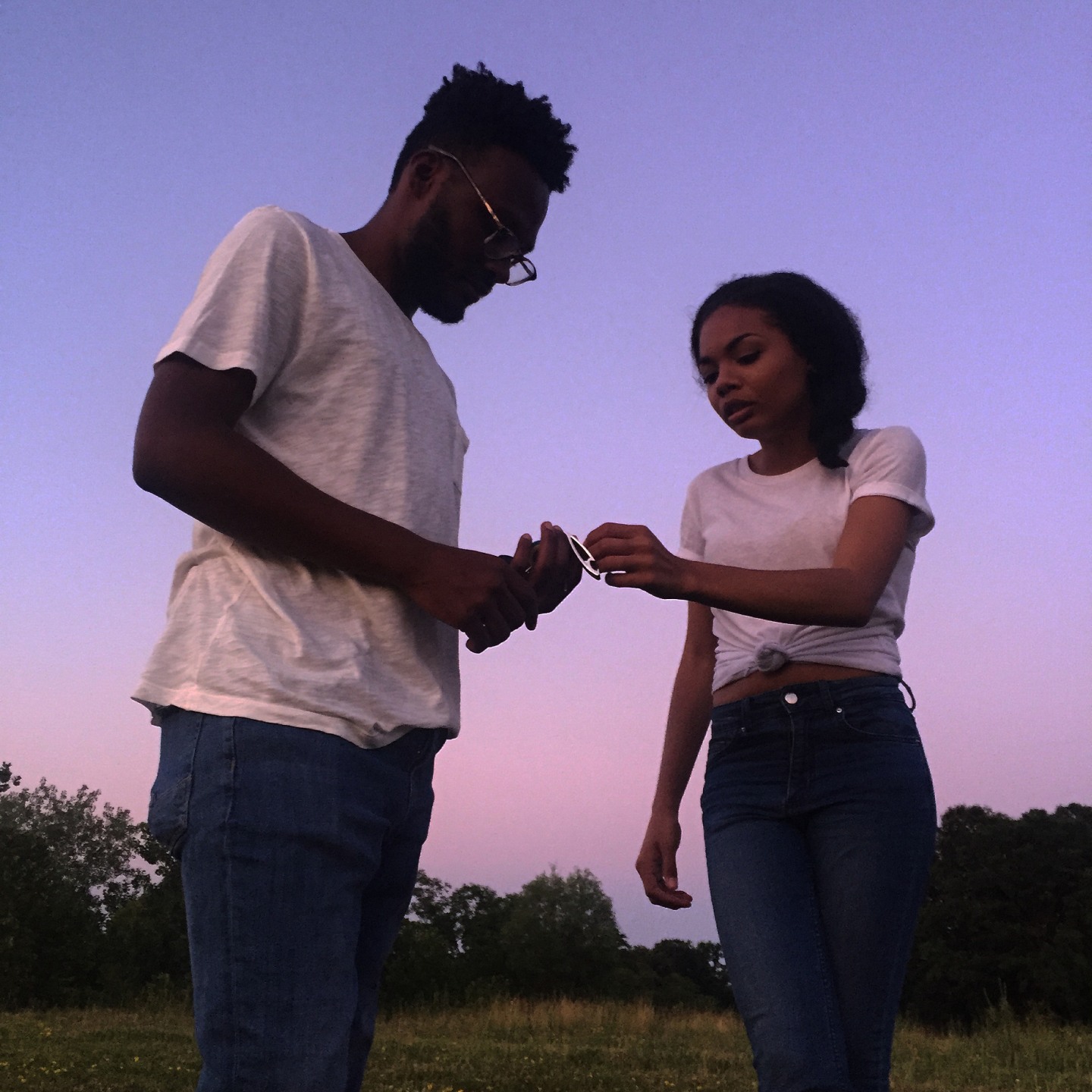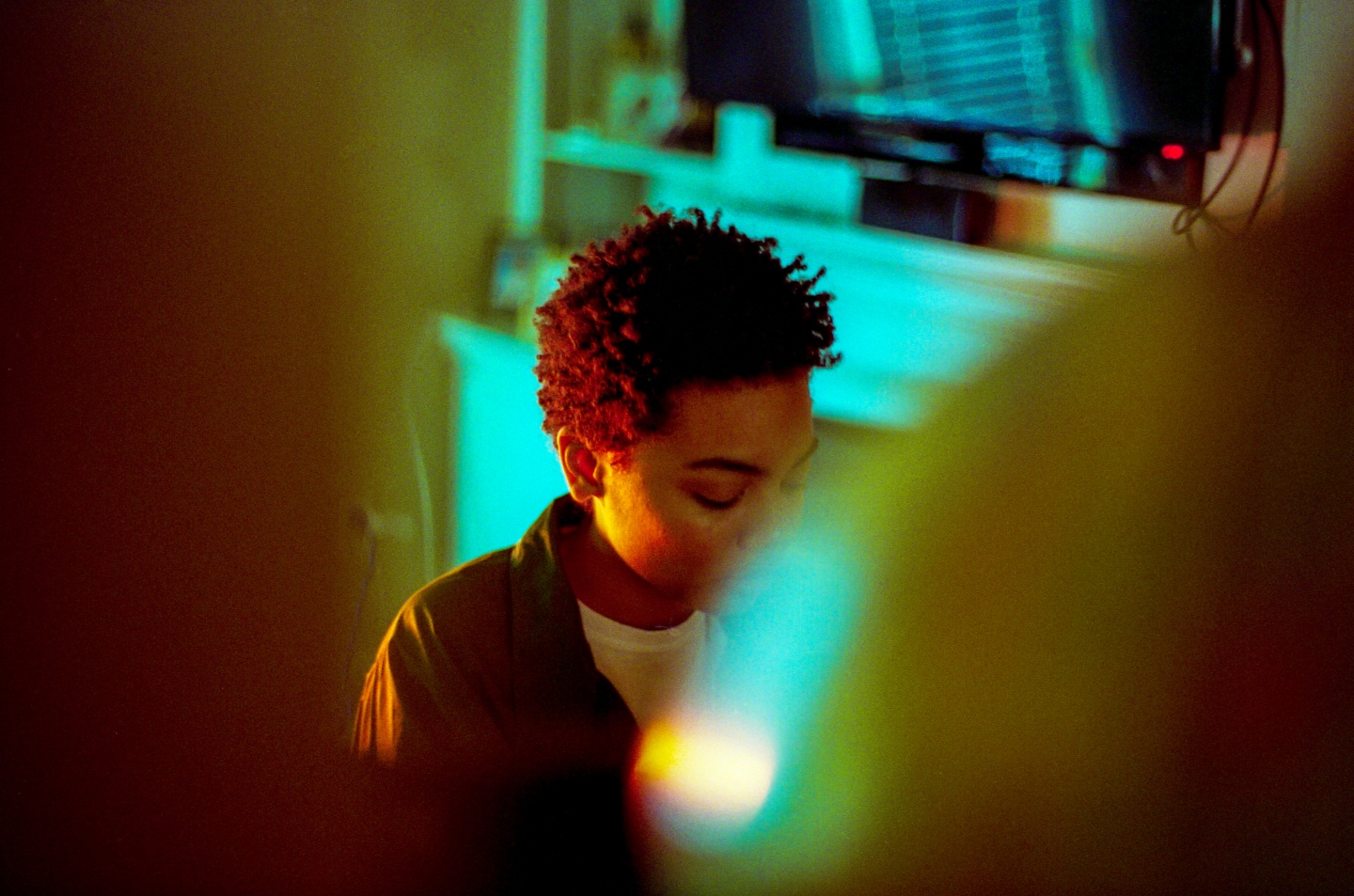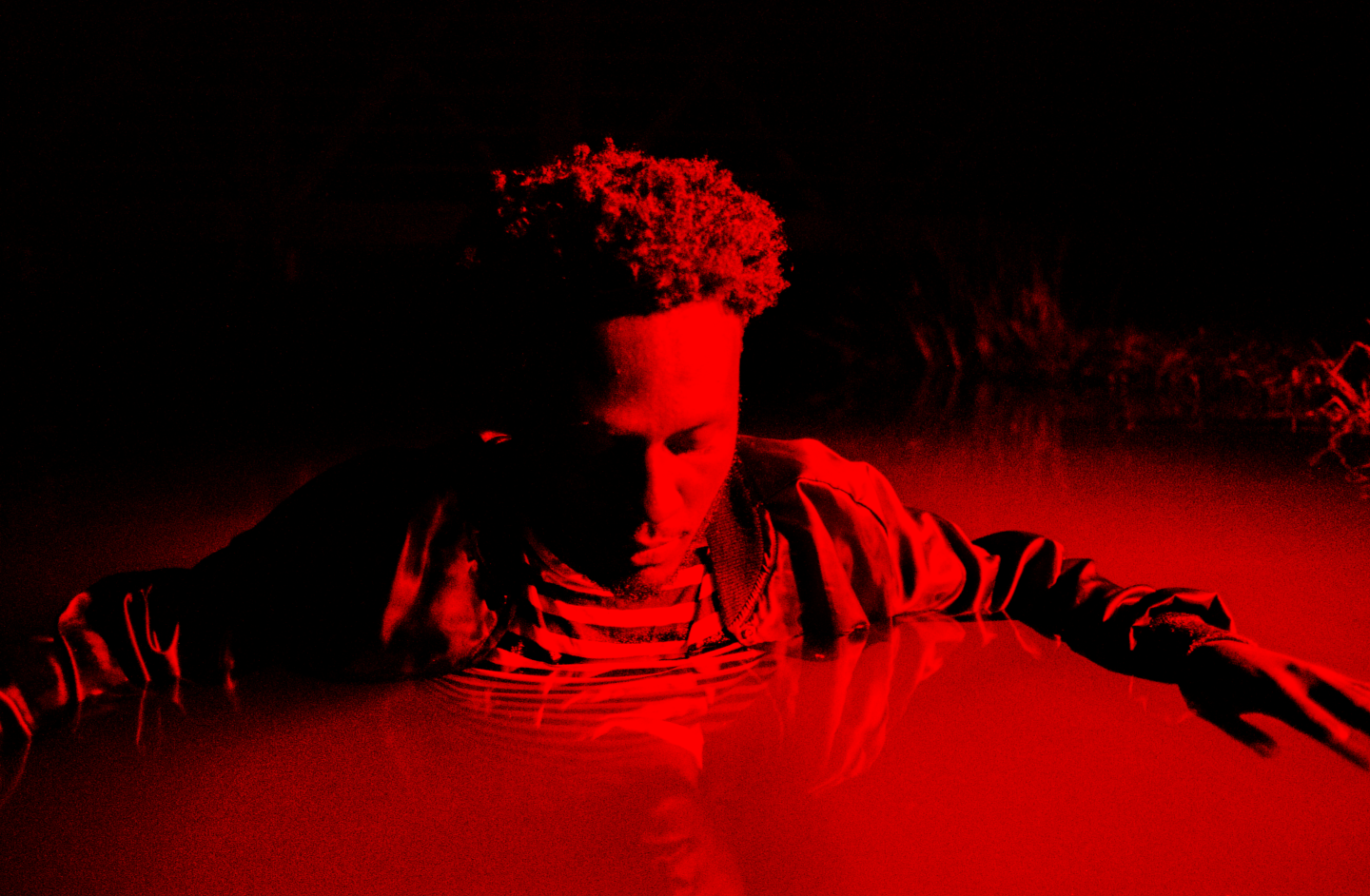 Photo by Daniel Diasgranados
Photo by Daniel Diasgranados
My favorite song on April + VISTA's new project You Are Here, is “How To Get By,” which starts with what sounds like a voice note-recorded mumble that grows into a rich, lullaby-like melody. A honeyed voice sings over gentle strums, looped drums, and some sunny keys: “If I sit and wait for time to pass by / the time that I spend could alter my life.”
That voice belongs to 28-year-old multi-instrumentalist April George, who makes up April + VISTA along with 26-year-old producer Matthew Thompson. When not at their respective day jobs of graphic designing and communications, the two make electronically-grounded music that pretty much defies genre, blending their influences of gospel, hip-hop, jazz, experimental pop, and rock to create deeply honest and warm songs centered around figuring out life. It’s comforting music that also provides a gentle catalyst for reflection.
Premiering today on The FADER is the duo’s third and newest project, You Are Here, which April + VISTA describe as the fullest realization of their artistic vision so far. You Are Here's collagist eight tracks reflects a lush, layered journey through the ups, downs, and in-betweens one experiences on the way to their final destination, at it's conclusion feeling like the big exhale that brings your shoulders down at the end of a long day.
On a phonecall last week from April's home in DC, the two share that the project was written and recorded over the course of a year that included joining Goldlink on his At What Cost tour last fall. One of the biggest takeaways from making it was engaging in experimentation and finding strength in support from the bubbling D.C. musical community — which is in the midst of a beautiful swell of a moment — they count themselves a part of.
How did each of you get into making music?
APRIL GEORGE: I come from a musical family. My grandmother made sure all of the kids could play piano and one of my aunts played violin. I wanted to be like her, and it never left me. I looked up to all my family members and stayed working hard because that's what I saw them do every day. I was forced to sing in the choir at church — I did not want to do that —and I didn't really start singing until college.
MATT VISTA: I was drawn to production at an early age from listening to Kanye West's The College Dropout. I started making beats in high school while I was listening through a lot of hip-hop, and a friend asked me if I rapped. I lied and said, "Nah, I make beats," which is when I downloaded FL Studio and churned out a couple beats. He said they were tight, so ever since then I never stopped.
What made you want to start making music on your own?
APRIL: You know how fish are born into water and they don't even know that they're swimming? Music was like that. I actually went to school for business but wasn't pursuing music professionally, and I remember writing on a blog: “This is something that I'm supposed to be doing, but I'm scared to pursue it." The older you get, the more conscious of the struggle. I'm still [making music] though, and I'll never stop.
How did you both start working together?
MATT: In spring of 2014, I'd just graduated and April found me on Soundcloud through mutual friends. We decide to link up at Busboys and Poets [in Washington, D.C.] so we could talk about working on a project that became Lanterns. We went full speed, and we haven't really stopped since.
You both have also worked with other artists separately. What's drawn you two to working collaboratively?
APRIL: When I first started out, I wasn't sure how to go about pursuing music at all. I just knew it was something I needed to be doing. I was writing songs alone but I would need someone to help me shape this sound I was trying to create out of nothing. My first introduction to collaborating with people was out of the need to expand the ideas I was coming up with. Later on, through meeting friends like Ciscero and Sugg [Savage], Matt, and later Goldlink, I realized the importance of knowing that you can't do everything by yourself. That's something I hold near and dear to me. When Matt and I worked on our first EP, we were trying to do everything ourselves and we realized, mostly through watching our friends and later working more closely with them, that everybody has a role that they play and a strength they have. When you're able to have everyone in the same room working on their own gears, it makes the whole machine run more smoothly rather than it would with one person.
MATT: I'd been making beats by myself since high school and putting beat tapes out through Bandcamp. A girl at school was like, "Why don't you give these to rappers?" That perplexed me, because at the time I was listening solely to Flying Lotus and Low End Theory beat-scene people — they were doing everything on their own, and I wanted to be like that. But I realized that, without anyone else, I wasn't growing as fast as I could have been. Also, it's more fun to work with someone who has the same interests as you. Collaborating with April fulfills a piece of my production that was really missing.
 April George
Photo by Daniel Diasgranados
April George
Photo by Daniel Diasgranados
Matt, when did you get involved in the D.C. music scene, and how has it changed since?
MATT: I got in the scene in high school, making beats with my friend Sir E.U. A bunch of other producers and rappers went to the same school — Friendly High School. After we graduated, I went off to college, but E.U and a few other folks nurtured and grew this little rap scene. Everyone used to go to Everlasting Life Cafe, and it would be open mic-style with a cypher and local teenage crews. I'd come back and forth (from Hampton to DC) because I was sending beats to rappers and hanging with folks during my breaks, so I always felt like I was an observer in a way because I was only there sometimes and I wish I was there more. I was able to watch the scene blossom from the outside. Now, with D.C. changing and the arts being pushed out, there aren't so many places for DIY artists to express themselves or nurture the scene. It's siloed off, and a lot of the folks that I came up with don't rap anymore — partially because their passion might not have been in it, but also because there wasn't an environment that could help them get to the next point [in their music] without them hitting that wall.
Are there any spots in the city that are still supportive?
APRIL: Yes, there are a couple beacons of light that still exist. There's a place called Uptown Art House, a safe space for artists to create that was spearheaded by our friend Jamal [Gray] of Nag Champa. If you make anything weird, Takoma Park’s Rhizome is where you go to perform. Then there's OTHERFEELS — who we're affiliated with — that's run by our manager James Scott up in Mount Pleasant.
MATT: There's 9:30 Club Backbar, which is the first place I ever DJ'd. You can't really call yourself a part of the scene for real if you don't do Velvet Lounge at least one time [laughs].
APRIL: As dodgy as it is, it gives our upcoming DJs a place to bang it out and figure it out. There are still places to perform what you make. There used to be places to practice, mingle, and meet — but those no longer exist.
In that vein, I talked to Mista Selecta a few months ago in New York about all the exciting music happening across the city and how supportive people are within that community, and he mentioned how certain apartments have become go-to spots for people to work together and make music.
APRIL: There are a few studios that we've been blessed enough to be connected to to record our project — but that was because we have these jobs and saved our coin. A lot of young kids don't have 9-to-5s — and shouldn't have to have them to create — so it has to happen in houses, like Ciscero's, or where Tony [Kill] and I live, where people can talk and express themselves.
MATT: The only thing we did in the studio was strings and vocals — the rest was in my bedroom.
How was your approach to this new project different than your previous projects?
MATT: We finished back in September 2017, just before we went on the Goldlink tour. It came together really slowly, which was intentional. We wanted to make something that we were excited to listen to and pushed the envelope for us. On our first project Lanterns, I'd finish a beat, lyrics would have finished lyrics, we'd put them together to make a song, and then, rinse and repeat. It was more formulaic. Our second project was similar, but a little less structured.
APRIL: Everything sounds like a collage, which is how we made it. Most of [the songs were] recorded on a phone before they were recorded anywhere else.
MATT: We wanted it to be comparable to all of our favorite artists, and we spent all the time we needed to make that happen. We talked a lot with our friends, listened to a lot, learned a lot, studied mad music. I learned how to play the bass. We wanted to incorporate organic elements to electronic tendencies. Bands like Hiatus Kaiyote, Radiohead, Donnie Hathaway, and Bjork do a great job of making music that's not pretentious. We wanted to do that.
APRIL: This was the time for us to finally figure out what our sound is. We believe so much in this project because this is who we are now, which is why we called the project You Are Here. Lyrically, it was totally an experiment for me, as I wanted to give the listener a holistic view of a personal experience. Our engineers both like to play with space — taking sounds and making them swirl around — and I wanted our lyrics to do that too.
What's your goal for the rest of the year? What do you hope to accomplish with this project?
APRIL: We want to quit our jobs, [and are] working hard day and night to do that. With this project, I want people to be encouraged and comfortable with where they are in life. Every song takes you through this arc of an experience, and you go through so many emotions and steps to get to that goal.
I also want us to open doors for black musicians who make different music because I feel like we get kind of pigeon-holed. The other day, I saw a tweet from Moses Sumney that was something like, If I made the electronic R&B people said I made, I'd be out of here. Because of the way we look, we get lumped into a bucket. Our music is informed by gospel, R&B — black music — but we also want to take that and move it into a different space, and walk into spaces where brown people aren't invited and say, "I can make this, too." We want to crack open that ceiling, especially in D.C. There are so many black and brown creatives that make interesting music and aren't afraid to be different. We want to blast open the floodgates so we can all start flourishing. If you can do that here in D.C., then you're good.
 Matt Vista
Photo by Daniel Diasgranados
Matt Vista
Photo by Daniel Diasgranados
 Photo by Daniel Diasgranados
Photo by Daniel Diasgranados